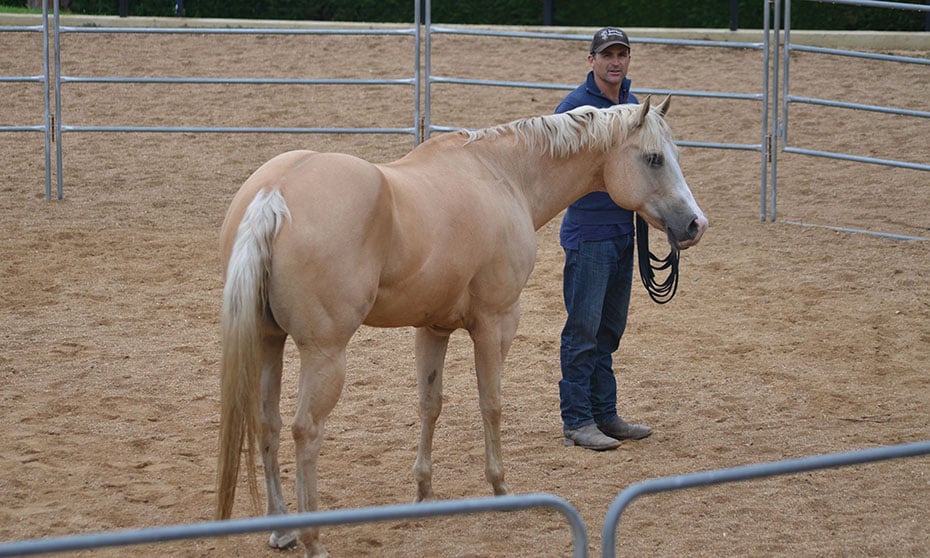
'Working with horses helps to bring out our natural instincts'

HRD talks to Emma Kirkwood, co-founder of Frontier Leadership and James Meurer, co-founder and facilitator of Frontier Leadership about how leaders can benefit from working with horses.
HRD: How does working with horses encourage better teamwork and motivation?
Wanting to have better teamwork is an easy goal to identify but a more challenging one to dissect when we ask individuals, “how would you know if you achieve it? What would be different? What would be the same?”
We believe that the teams who produce great work together are the ones who have reciprocal trust, respect and an alignment to the same standards of excellence in deliverables and achievements. In short, they’re motivated to work together because they continue to achieve, grow and belong.
The same is true for horses. They are natural herd animals and work hard to maintain a ‘team’ structure which has them outrun predators, find water and the richest pastures and look out for each other in lean times, all so they can continue to exist.
Working with horses helps to bring out our natural instincts. As James explains, our primal selves emerge – the part of us that seeks social connection and is intrinsically motivated by being part of something bigger than ourselves.
Feedback from our participants often includes how much the time working with horses helped them become closer as a team, develop awareness of each other’s strengths, and from there improve their ability to rely on and work with each other.
With each team member being moved out of their comfort zone during the training experience, they found a new level of support and recognition from those they’ve been working alongside of (but not truly engaging with).
READ MORE: Leadership key for top companies
HRD: How do you see people’s attitude to horses evolve after having worked with them?
One of the many amazing aspects of running this program is watching people become more relaxed, open and comfortable as the day progresses. It truly does allow people to escape their busy minds, connect with themselves and with those around them.
One evolution we commonly see is the change from people wanting to ‘control’ the horse, for example by using a rope, a treat or other such incentives, all things designed to get the horse to do only what they want, on demand and without consideration.
As the day progresses, this shifts towards people starting to lead the horse and experience the horse following willingly, with no physical ropes, force or treats required, and both parties freely committed to the same objective.
Another evolution often occurs when a participant initially wants nothing to do with the horse. They may be fearful or just not interested. Either way, by going through the process, people start to become more curious and with that curiosity comes the opportunity for learning.
By the end of the day, it is often particularly these individuals who realise that they are capable of so much more than they are currently contributing and are ready to explore the possibilities of greater achievement in other areas, where they’ve previously been playing it safe.
At the core of our training is understanding that the horse is a metaphor, they represent the person who we’re wanting to influence - be that a team member, a client, a key stakeholder or perhaps even our boss. By the end of the workshop, people are more appreciative of their own ability to achieve the outcomes they desire by communicating and working with, collaborating and creating a positive relationship with others.
READ MORE: Dismal lack of cultural diversity in key leadership positions
HRD: If there’s one piece of advice you would give HR professionals on leadership from having worked with horses, what would it be?
Now, more than ever, it’s time for leaders to get in the arena. Whether this is a business arena or an equestrian arena, we live in a time of unprecedented change.
More and more people are reporting feeling isolated, disconnected and disenfranchised, from work and in life. The successful leaders of the future will be those who are responsive and adaptable.
Those who have the ability to connect, influence and inspire a diverse range of people across different demographics, competing priorities and sometimes polarised views and beliefs to come together and achieve a common goal.
I often think of the African Proverb, ‘If you want to go fast, go alone. If you want to go far, go together.’ In order to achieve business outcomes and growth, it’s vital that teams come together and that leaders are able to connect, inspire and relate.
Working with horses teaches you these skills in a way in which no other leadership or professional development course I’ve attended has even come close to.
It will take you out of your comfort zone, you will be required to do things differently to how you’ve done them before and by doing so, you will gain new insights, skills and learnings to help you get to where you want to go.